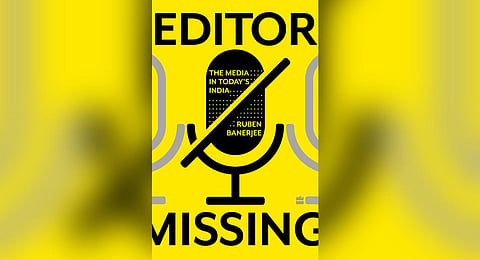

Ideally, the media in a democratic setup is expected to play the role of a bridge of communication trying to show the mirror to the ruling establishment and highlighting hardships and woes of common citizens. In independent India’s 75 years of history, media has had its own ups and downs. At times, it took on the government of the day paying a heavy price and at other times, compromised on the intrinsic values of the fourth estate.
Editor Missing by Ruben Banerjee, the former Editor-in-Chief of the weekly magazine Outlook, is an honest account of the conflict of interest faced by the media in today’s India’. Pressures and counter pressures faced by the proprietor of a media platform and dark shadows on the institution of the ‘editor’ on whose shoulders rests the responsibility of steering the ship, in good as well as bad times, loom ominously large.
While Banerjee led the weekly for about three years, the May 24, 2021 issue with a cover carrying the word ‘Missing’ with three staccato line underneath––Name: Government of India, Age: Seven years, Inform: Citizens of India––showered “brickbats and bouquets” on him as the magazine highlighted the gov- ernment’s failure in handling the second wave of the pandemic.
“Defending truth can exact unintended costs, and the behind-the-scene story of our ‘Missing’ cover serves as an eloquent testimony of it,” writes Banerjee, about the time when the issue had hit the ruling establishment hard, leading to his eventual exit.
Banerjee has presented his case succinctly without mincing words, as he says “I stood summarily sacked. The termination knocked off in a trice whatever trace of self-importance I may have acquired over the years,” adding, “I was unequivocally shown to be a paper tiger without teeth and claws, who served only at the pleasure of the promoters”.
Without a feeling of hurt or of wounded pride, the author goes on to say that his sacking “in more ways than one, held up a mirror to myriad problems our noble profession confronted, more than ever.”
Many of us, who have been part of the industry, will surely endorse Banerjee when he analyses the contemporary journalistic ecosystem wherein “increased competition in the media space and shrinking revenues have ostensibly multiplied the pressures on promoters who now attach a greater premium on balance sheets of companies they run.
They are more dependent on governments––at the Centre and states––for survival”. Banerjee’s words that “intermittent raids on the premises of several media houses have also put real fears in many of them”, are a telling commentary on the media in today’s India.
The book, in its author’s own words, “seeks to understand how deep the rot is in journalism in India and whether the profession is redeemable”.
Interestingly narrated, the author has done justice to a principled cause whose survival is so crucial to the existence of democracy in the country.